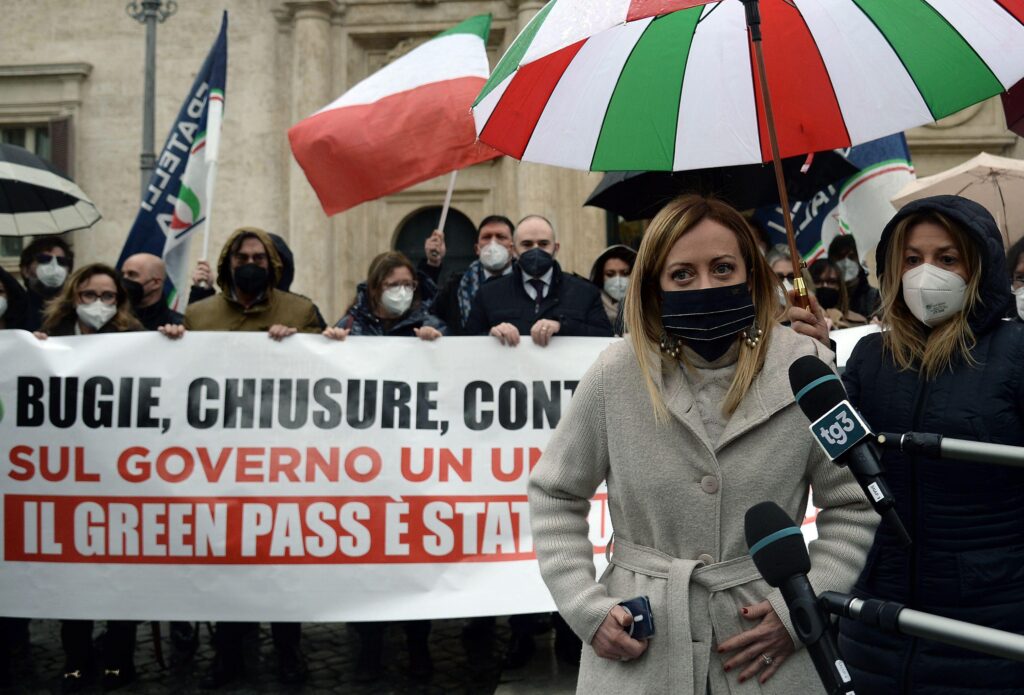As Italy’s presidential election looms, the far-right Fratelli d’Italia’s leader Giorgia Meloni has tried to retain her party’s populist identity while also appealing to mainstream-conservatives. How far can she go?

– Independent Photo Agency/Alamy Live News
Giorgia Meloni has options. After refusing to join Matteo Draghi’s broad coalition government last February, (quoting Brecht to explain her decision), she and her post-fascist Fratelli d’Italia, or Brothers of Italy, have been on the march. By July, they were level in the polls with Salvini’s right-wing Lega Nord, part of the unity government. Now, they’re the second-most popular party. Meloni’s tough, uncompromising style, and refusal to join the coalition, has paid off. But with the decline of the centre-right Forza, and the Lega hurt from joining Draghi, she could try to attract a broader conservative vote and unify the Italian right.
But this is unlikely—at least for now. By refusing to join the government, she made her party the country’s only ‘opposition force,’ though one working ‘in the national interest.’ This gave her exposure, but also solidified the Fratelli’s image as a party outside the ordinary and established. And in a polarised political landscape, marked by distrust of conventional groups and candidates, having such a reputation is appealing. The fringe parties that have surged in recent years have drawn strength from opposing the status quo. As the only party not to join Draghi’s government at a time of crisis, her decision could have been seen to be unpatriotic. Instead, it’s been viewed by her supporters as affirming the party’s place outside the mainstream.
The rise and slide of Salvini’s League serves as a cautionary tale for the Fratelli. Salvini was a face of the European populist far-right when he first rose to prominence. Wooed by Steve Bannon, the intellectual architect of Trumpism, Salvini came across as media-savvy and modern. By the end of the 2019 European Parliament elections, the Lega was polling at 39 percent. But three months later, he made a mistake. As deputy prime minister in a coalition with the Five Star Movement, he collapsed the government, hoping to force a snap election and become prime minister. Instead, the Lega were pushed out of power. And his decision last year to join Draghi, once president of the European Central Bank, was seen by some of his base as a betrayal. Since then, he’s been bleeding voters, mainly to the Fratelli. Meloni will be careful not to make the same mistakes. If she shifts to the centre, she may not take her core support with her.
Meloni may hope that she can win over more moderate conservatives without needing to change her party’s outlook. Her candid memoir, Io sono Giorgia: Le Mie Radici, Le Mie Idee (I am Giorgia: My Roots, My Ideas) was written with voters outside her party in mind. It became an unexpected hit, selling over 100,000 copies and topping the Italian book sales charts for weeks. The book humanizes a politician often described with words like ‘fiery’ and ‘combative’. And Meloni has also addressed descriptions of her party. She says the Fratelli are already ‘conservative’, citing the Fratelli’s membership of the European Conservatives Reformists party (of which she’s president), and rejects the label ‘far-right’. (The ECR has more than 40 members, including the U.S. Republican Party.) She blames the media for the unflattering political description: ‘an over-simplification’, as she told Foreign Policy. This may reflect a wider recalibration of political language: Santiago Abascal of the hard-right Spanish party Vox, announced on Twitter he would host a summit of ‘patriotic leaders and European conservatives’ this month. Among these leaders include familiar faces of the far-right: Jarosław Kaczyński, president of the Polish Law and Justice party; Marine Le Pen, of the French National Rally.
This might be a hard sell. In fact Fratelli d’Italia’s image may simply be too toxic to appeal to a more moderate Italian voter. Though Italy’s relationship with its fascist past is complex, even ambiguous, it’s still striking that the Fratelli’s logo bears the flaming torch insignia of its neofascist ancestor: the Italian Social Movement, or MSI. It’s one reason some feel the party hasn’t severed itself from its roots. Another is Meloni’s honouring last year of three MSI members killed in 1978. On the same day, militants marking the event, (but unaffiliated with the Fratelli), gathered in Rome and gave the fascist salute.
For now, Meloni is on an upward trajectory and biding her time. She’s built a strong political network, cultivating good relationships in the U.S., speaking at the Conservative Political Action Conference, and defended Trump and Trumpism. She’s received a personal endorsement from Hungary’s nationalist prime minister Viktor Orbán, and last summer met him in Rome; and she’s been meeting other like-minded leaders, including Mateusz Morawiecki of Poland and Janez Janša of Slovenia. More, there have been headline defections to the Fratelli from the Lega, including the fiancé of Marion Maréchal Le Pen, Vincenzo Sofo. (Marechal is the niece of Marine Le Pen.) She will be in no rush to change course.
It bears noting that there’s just a chance Meloni might be in power very soon. The Italian presidential election begins today in Rome, and Silvio Berlusconi, once considered a likely winner, has reluctantly withdrawn. That leaves the door open for Matteo Draghi to succeed Sergio Mattarella as head of state; he is thought to want to leave the prime minister’s residence for the presidential Quirinale. But finding someone to keep together his diverse coalition might be tricky; a snap election, though unlikely, is therefore possible. What then? A right-wing coalition would very likely be formed. And Italy might just get its first female prime minister—in the shape of Giorgia Meloni.
Harry Readhead is a writer and editor from London. He writes about politics and literature for titles like The Guardian, The New Statesman and The Times Literary Supplement.







